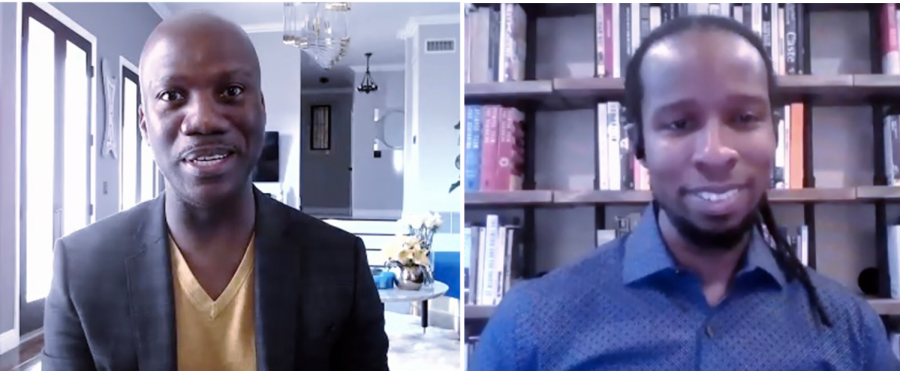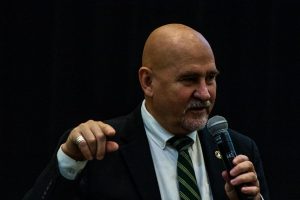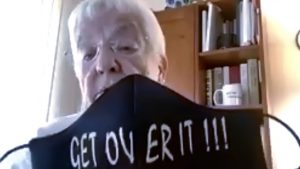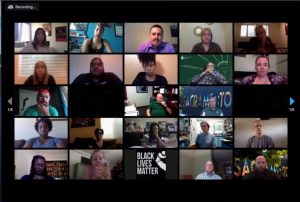Sac State’s Fall 2020 Convocation addresses anti-racism efforts in higher education
Ibram X. Kendi and Shaun Harper speak on anti-racism
Shaun Harper (left) and Ibram X. Kendi were the keynote speakers for the Sacramento State Fall 2020 Convocation held on Tuesday, Sept. 29, 2020. Harper and Kendi shared their research and experience on the topic of anti-racism. Screenshots by Jenna Cooper via Zoom/collage by Max Connor.
September 30, 2020
Sacramento State held its Fall 2020 Convocation with a theme of “Advancing Our Commitment to Antiracism” Tuesday via Zoom.
The event featured guest speakers Ibram X. Kendi, #1 New York Times bestselling author and recipient of the Andrew W. Mellon professorship in the humanities at Boston University, and Shaun Harper, professor and executive director for the University of Southern California Race and Equity Center.
Story continues below tweet.
Today’s convocation is “an opportunity to look toward the possibility of what Sacramento State can become” says Diana Tate Vermeire, vice president of the division of inclusive excellence @sacstate @TheStateHornet pic.twitter.com/OWH7hfpcmE
— Jenna Cooper (@jelizabethcoop) September 29, 2020
“To be anti-racist is actually to reject any idea that there is something wrong with any group of people and certainly to reject the idea that any group of people needs to be saved,” Kendi said.
Kendi participated in an hour long Q&A with Diana Tate Vermeire, vice president for inclusive excellence at Sac State, who asked prepared questions as well as live questions submitted from attendees.
Harper gave a presentation about his 15 years of research with the National Assessment of Collegiate Campus Climates survey and earlier surveys he and his team conducted.
According to the USC Race and Equity Center the NACCC survey, “provides data about undergraduate students’ appraisals of institutional commitment to equity and inclusion, the extent to which they interact meaningfully with diverse others, where and what they learn about race and their feelings of readiness for citizenship in a racially diverse democracy.”
John Johnson, Sac State director of inclusive excellence learning, said 3,341 people registered for the Convocation.
President Robert Nelsen acknowledged the many years staff, faculty and students have spent advancing inclusion and anti-racism at Sac State.
“We need to acknowledge everything they’ve done, but we have farther to go,” Nelsen said.
In 1947 Sac State began “with a mission to further democratize access to education,” said Paula Austin, professor of history and African-American Studies at Boston University.
By 1973, 45% of the Sac State student body was 25 years or older, 44% was women but only 3% was Black, Austin said.
Diversity at Sac State continued to rise throughout the years according to the latest college diversity report posted in 2017 by datausa.io.
Despite the growing diversity rates at Sac State, “there are still systemic problems within our education system,” Harper said.
“Colleges and universities have racial problems,” Harper said.
Harper describes one of these problems as curricular racism.
“Students don’t see themselves in the curriculum,” said Harper. “The curriculum is the place where students feel the least sense of belonging.”
Kendi also stated that anti-racism is not just institutional, but individual, and starts by admitting the subtly racist thoughts one might have, even against oneself.
“I tried to be honest with myself about those times when I thought there was something wrong and inferior about Black people,” Kendi said. “And the reason why it is so critical to just give voice to that is because it is freeing us of denial. We can then start treating ourselves or getting treatment.”
Harper affirmed the idea that anti-racism starts with a conversation with oneself.
“You can’t be anti-racist if you are unwilling or unable to talk about race,” Harper said. “The talk begins with one’s self before it extends to a conversation with colleagues about the realities and complexities of race there at Sacramento State.”
Story continues below tweet.
.@DrShaunHarper displays questions for the audience to ask themselves: pic.twitter.com/Tc7KCPKTJO
— Jenna Cooper (@jelizabethcoop) September 30, 2020
As he reflected on his 22-year career in higher education, Harper said the amount of data collected, published and publicized on campuses confirms the “deeply entrenched racial inequities.”
“The things we have been hearing over the summer about anti-black racism, we have been hearing for 15 years in our research with Black students and other students of color at colleges and universities that participated in the campus assessments,” Harper said.
In between Kendi and Harper the convocation was broken up into separate one or two hour breakout sessions on various topics.
In one of the sessions, Sac State faculty discussed racism and anti-racism in higher education and their strategies to allow for more inclusivity in their classrooms.
Amber Gonzalez, a Sac State associate professor of child and adolescent development said making courses inclusive starts with the construction of a class syllabus.
“Who does a syllabus serve?” Gonzalez asked. “Does it serve the institution or is the syllabus supposed to serve the students?”
Story continues below tweet.
“Equity needs to be the foundation in order to move us forward,” says Amber Gonzalez, associate professor for child and adolescent development @sacstate. @TheStateHornet pic.twitter.com/d39QdcyaLg
— Jenna Cooper (@jelizabethcoop) September 29, 2020
Aishah Patterson, assistant professor of communication sciences and disorders at Sac State, said during the session she readily recognizes that an individual’s learning and sense of presence in a classroom can be impacted under trauma or increased stressors such as housing instability and food scarcity.
Patterson said she incorporates inclusivity in her classroom by providing many different types of assignments, instead of a large project, to give students more opportunity to show what they know and have learned.
“When we have multiple chances for students to learn and multiple chances to demonstrate skill and acquisition of new skill, I think we provide a more supportive inclusive learning environment,” Patterson said.
Patterson said she also incorporates inclusivity in her classroom by simply asking her students how they are doing, which lets them know they are recognized as being valid members of class.
Kendi provided some hope for the future for institutions that focus on real change in outcome and policies.
“If we are outcome focused as we should be, if we are serious about transforming policies and practices and resource distribution, if we are serious about outcome, about creating equity then anything is on the table,” Kendi said.









































































































































Stacie Louise Walton • Oct 3, 2020 at 3:57 pm
After attending the 2020 Convocation as a concerned community member ( and member of the Rennaisance Society on campus), I wonder how Shaun Harper and Ibrim Kendi would advise the administration of the campus overall and the department of Theater & Dance in particular in moving towards anti-racist policies as it relates to the BE FREE movement. I appreciate that Shaun Harper said the work starts with a conversation with self and an honest inventory of your past behaviors. Sac State remains at a critical crossroads- does the organization choose anti-racism or the status quo. Is the department of theater and dance willing to do the very hard and difficult work of personal and departmental self-reflection?
Theater and Dance ( like healthcare which is my professional field) is full of traumatized individuals who find themselves in positions of authority. Success in the field is often dependent on out of control competition and nepotism. It requires an intentional decision to NOT perpetuate the trauma one experienced navigating the profession oneself.
The conversation should have the students front and center. This relinquishing of power can be difficult but at the same time extremely liberating. Wishing you all the best…